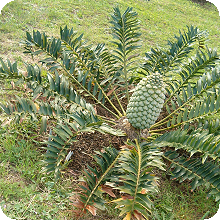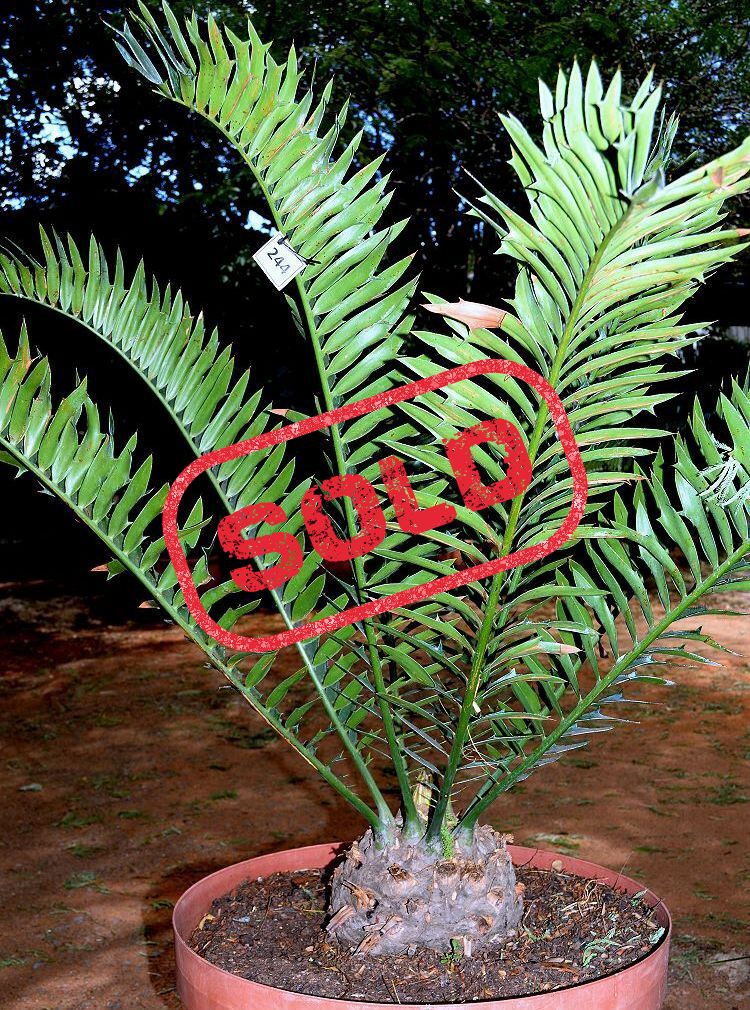|
| Division: Cycadophyta |
| Class: Cycadopsida |
| Order: Cycadales |
| Family: Zamiaceae |
| Genus: Encephalartos |
| Species: E. arenarius |
Conservation Status: |

E. arenarius
Alexandria CycadEncephalartos arenarius is endemic to South Africa, where it is limited to the Eastern Cape. Its common names include Alexandria cycad and dune cycad.
It is a multi-stemmed cycad with a lead stem of 1-2 m long and is 200-300 mm in diameter. The lead stem often lies on the ground covered in sand and leaf mould.
There are often a number of basal suckers competing for the lead. The leaves are 1.0-1.5 m long, dull green, and the leaf stalk recurves sharply at the tip. A blue-leaved form occurs in certain localities.
Female cones are normally solitary, barrel-shaped, 500-600 x 250-300 mm, and light green when mature. The cone scale opens for 5 to 10 days in April to May. The male cones, 1 to 3 in number, 300-500 x 80-150 mm, are light green when mature. The seed is shiny red when mature.
This species lives in densely wooded dune habitat and scrub. It is an endangered species with a maximum global population estimated at around 1500 mature individuals. Most subpopulations occur near the town of Alexandria, Eastern Cape.
Cultivation:
Encephalartos arenarius is easily grown from seed. Since cycad seeds are toxic to humans, one should use gloves when handling or cleaning them.
Hand-pollination is necessary for a successful seed harvest in cultivation. Collect pollen as soon as it starts shedding. If a slight tapping of the male cone sheds pollen, then the cone is ready to be harvested; store pollen at -15°C for best results. The female cone scales have to be monitored to check if they are open. The window of the scale opening varies with individual plants, from three days to two weeks.
After female cones have been collected, the seeds are left to mature for a year before sowing at the beginning of summer. For best results, sow seeds in river sand on a heated bench at 24-28°C. Germination should start three weeks after sowing though some will take longer. It is easily transplanted and can also be propagated from suckers.
Leaves and cones are prone to scale and mealy bug. The gall-midge also attacks young leaves.
| full sun | blue-green | low watering | slow growth | frost-resistant | common |
Encephalartos arenarius is easily grown from seed. Since cycad seeds are toxic to humans, one should use gloves when handling or cleaning them.
Hand-pollination is necessary for a successful seed harvest in cultivation. Collect pollen as soon as it starts shedding. If a slight tapping of the male cone sheds pollen, then the cone is ready to be harvested; store pollen at -15°C for best results. The female cone scales have to be monitored to check if they are open. The window of the scale opening varies with individual plants, from three days to two weeks.
After female cones have been collected, the seeds are left to mature for a year before sowing at the beginning of summer. For best results, sow seeds in river sand on a heated bench at 24-28°C. Germination should start three weeks after sowing though some will take longer. It is easily transplanted and can also be propagated from suckers.
Leaves and cones are prone to scale and mealy bug. The gall-midge also attacks young leaves.
E. arenarius for sale at AfricaCycads.com:
|
|
|
|




